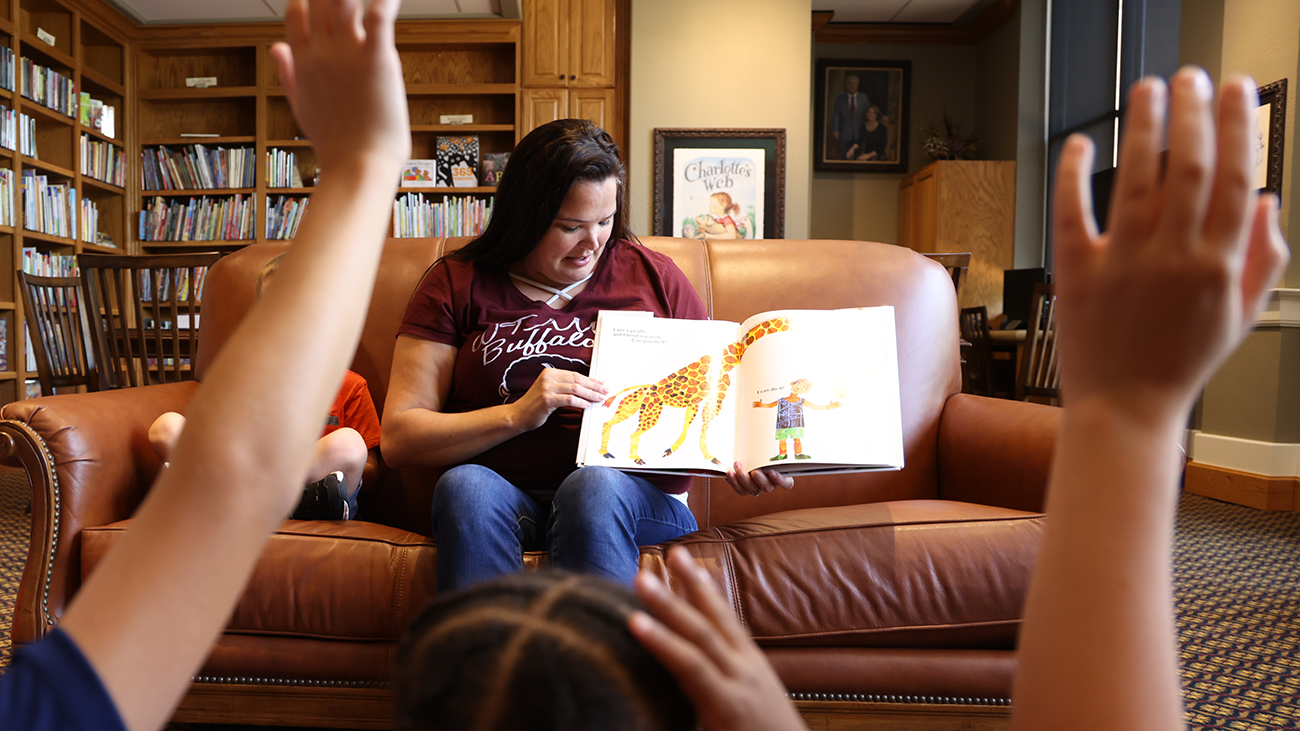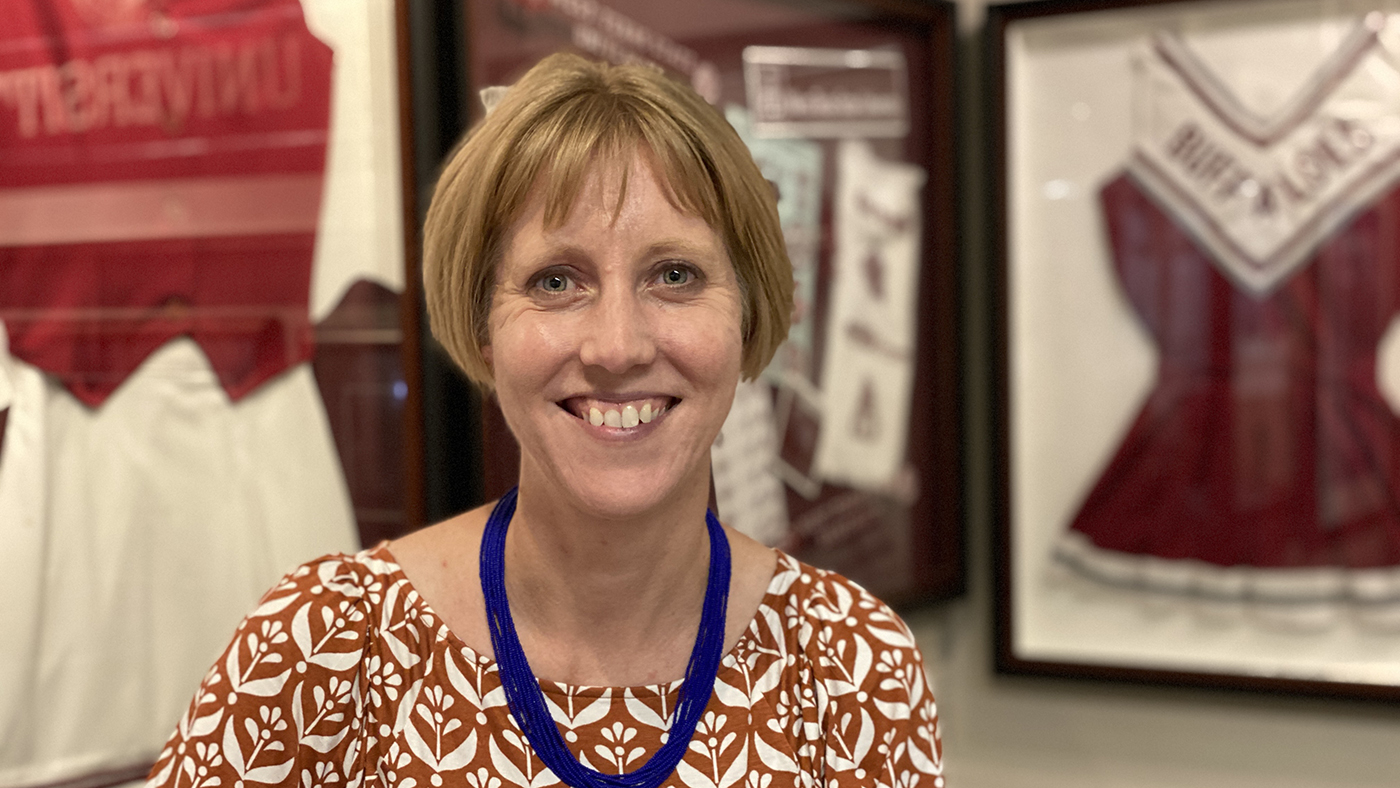- Social Sciences
- Jon Mark Beilue
- Featured
- Education
- Research
- Community
Jon Mark Beilue: Preventing the reading gap
WT professor heads study to stop reading gap before it starts
Prevention, not intervention. That’s the goal of a new study that Dr. Ashley Pinkham and colleagues from New York and Canada will lead to close reading gaps among children before they reach kindergarten.
“That’s exactly it – to be proactive rather than reactive,” said Pinkham, associate professor of psychology in West Texas A&M University’s College of Education and Social Sciences. “The buzz phrase is we’re trying to ‘level the playing field’ for children from disadvantaged backgrounds.”
Pinkham is part of a group which recently received a four-year $1.5 million grant from the Institute of Education Sciences to fund research into how taxonomically organized books and video could bridge the knowledge gap with educationally at-risk students. WT will receive $200,000 in funding.
“Educationally at-risk” is a sweeping description that mostly comes under the broom of economically disadvantaged children and those for whom English is a second language. The purpose behind the study is to identify and close that gap before a child enters post-kindergarten grades.
“A lot of children from at-risk backgrounds start to pull away from children from more advantaged backgrounds in terms of school achievement and reading ability in the elementary school years,” Pinkham said. “We see that gap get wider and wider as they progress into middle school and high school.
“Often what happens is we wait until children begin to fail in reading and we swoop in and intervene with extra attention. The study is focused not on intervention, but prevention, back to the first concepts of reading and prevent that gap from occurring in the first place.”

Covid-19 has complicated the timing of the study, which will be five separate studies over four years. Pinkham will work with Dr. Susan Neuman of New York University and Dr. Tanya Kaefer of Lakehead University in Thunder Bay, Ontario, Canada.
The pilot program will be with children from ages 3 to 5 in pre-K and Headstart programs as well as kindergarten in Brooklyn and the Bronx in New York City. Plans are to use data from that study to eventually implement in the Texas Panhandle, which flows well into the vision of WT 125: From the Panhandle to the World, the University’s long-term plan.
“All I Really Need to Know I Learned in Kindergarten” is a book written in 1986 by Robert Fulghum. Though the focus of the book is on manners, responsibility and a balance of work and play, it does underscore the importance of learning basic values at a young age. That’s true with reading.
“It’s incredibly important,” Pinkham said. “One of the biggest predictors of adult literacy is going to be how children perform, what skills they bring to kindergarten. Children who have a strong knowledge of the alphabet and experience with nursery rhymes, those children seem to be stronger readers in high school and even in college. There are gaps in students at WT that can be traced back to when they were 3 and 4 years of age.”
The traditional approach to beginning reading leans more on decoding than comprehension, Pinkham said. Decoding is giving the correct sound to each letter, and then putting those sounds together to form the printed word.
“Don’t get me wrong, decoding is important, but a lot of traditional approaches focus on only the decoding aspect,” Pinkham said. “They see the word ‘cat.’ They decode the word and sound it out. But there are only so many sounds in the English language. They may be able to sound out the word and not comprehend what it means.”
This study puts more emphasis on comprehension and understanding what the word means. As Pinkham said, “When we focus on comprehension, decoding comes along for the ride.”
Comprehension is done taxonomically, which is the technique of classification in ordered categories.
“To get in the weeds a little bit, the way vocabulary is taught in early childhood is through themes – ‘down on the farm,’ or next week it’s ‘grocery store,’ and the next week is ‘hospital.’ When it’s ‘down on the farm,’ children learn what is on a farm – animals and crops and tractors,” Pinkham said.
“When you teach in that way, you’re not setting them up to gain knowledge in the future. A child is told a chicken lives on the farm. What do they know about chickens, what can they generalize? Not really anything. They just know they live on a farm.”
By teaching taxonomically, Pinkham and her colleagues believe through non-fiction narrative books, children can comprehend words better, which, in turn, makes reading easier and future learning greater.
“Let’s say now we’re categorizing insects and what makes an insect an insect,” Pinkham said. “They need three body segments, six legs, two antennae. I have all this category knowledge. So here’s a katydid. Is it an insect? Yes, I can count its legs and body segments and make a basic assumption it’s an insect.
“What about a spider? Is a spider an insect? Well, it has two body segments, eight legs and no antennae. So, no. It’s a much more powerful way to organize information because a child can generalize that to new experiences.
“We believe that if we focus on building children’s knowledge, their understanding of concepts, their understanding of what makes an insect an insect, for example, then if they encounter a new word, they will more likely be able to understand it, not just sound it out.”
One day Pinkham hopes to take the study to early childhood in the Amarillo-Canyon area as well as rural parts of the Panhandle, tailoring the curriculum to rural at-risk children because urban poverty is different than rural poverty.
“Children in rural settings are in danger of falling behind, but their understanding of the world is different, and their needs are unique,” Pinkham said. “Children who grow up on a farm have a much better foundation of biology and science than urban children.”
And if the study is a success, and taxonomic reading takes hold in the Panhandle, it might also make Pinkham’s job a little easier one day.
“I say this flippantly,” she said, “but if I can prevent a 4-year-old from an at-risk home from that reading gap, then my life as a professor to my college students will be so much easier 15 years from now.”
Do you know of a student, faculty member, project, an alumnus or any other story idea for “WT: The Heart and Soul of the Texas Panhandle?” If so, email Jon Mark Beilue at jbeilue@wtamu.edu.

